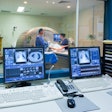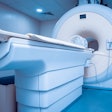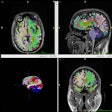
Physician groups that own their own MRI scanners order more studies -- but the scans are more often negative when compared with physician groups that don't own a scanner. The finding could be a sign of overutilization, according to a new study published in the September issue of the American Journal of Roentgenology.
The findings illuminate how self-referral affects imaging use, and how self-referral is a key factor to consider in the ongoing debate on how to best reduce healthcare costs, according to lead author Dr. Timothy Amrhein, from the Medical University of South Carolina, and colleagues.
"Self-referral of imaging studies has been singled out as a potentially important factor contributing to rising healthcare costs because, critics assert, financial interest can lead to overutilization," Amrhein's group wrote (AJR, September 2013, Vol. 201:3, pp. 605-610).
Assessing appropriateness
Studies on self-referral's effects on imaging use have been criticized for their inability to assess the appropriateness of the exams ordered -- a task confounded by factors such as clinical setting, disease prevalence, referral biases, and terminology differences between interpreting radiologists. That's why Amrhein's team wanted to assess the rate of normal exams (i.e., negative studies) as well as compare the prevalence and severity of disease within the subject population.
"We set out to test the null hypothesis that no difference in utilization exists between physician groups with self-referred imaging practices and physician groups that do not engage in self-referred imaging," the team wrote. "To do this, we tested two subordinate hypotheses: There is no difference in the rate of negative MRI scans between self-referred and non-self-referred groups, and there is no difference, among positive scans, in individual lesion prevalence in the two groups."
For the study, Amrhein's team reviewed 1,140 consecutive shoulder MRI scans ordered between January and September 2009 by two referring orthopedic groups serving the same geographic community (kept anonymous to protect the identities of the physician groups).
 Dr. Ramsey Kilani of Duke University.
Dr. Ramsey Kilani of Duke University.
The first group owned the scanners used and received technical fees for their use. The second group did not own the scanners used and had no direct financial interest. The shoulder scans were performed with identical protocols and were interpreted by a single radiologist group without financial interest in the imaging equipment used.
The researchers found that 255 of the 1,140 shoulder MRI scans were negative. The group that owned the scanners had 25.6% more negative scans (142 scans, compared with 113 for the group that did not own the scanners). This result was statistically significant (p = 0.047).
"[Our] data suggest that there may be a lower threshold for shoulder MRI referral in the financially incentivized group compared with physicians with no financial incentive in MRI equipment," the team wrote.
There was no statistically significant difference in the average number of lesions per positive scan (1.67 for the financially incentivized group and 1.71 for the nonfinancially incentivized group), and there was no statistically significant difference in the frequency of 19 of 20 lesion subtypes.
The fact that there was little difference in the frequency of these lesions is informative, as physicians who self-refer argue their patients are sicker and thus need the immediate access to imaging they provide with their office units, according to study co-author Dr. Ramsey Kilani of Duke University.
"There are probably some scenarios in which that's true, but it didn't prove to be so in this study," Kilani told AuntMinnie.com. "The positive scans showed us that the patient groups were almost identical in their disease -- rebutting the argument that the patients that physicians who have MRI scanners see are sicker."
Although the study does suggest a bias toward increased utilization of shoulder MRI by physicians with a financial interest in the MRI equipment used, it doesn't prove intended overutilization for profit, Kilani said.
"Doctors that own MRI scanners order significantly more negative scans," he said. "We're not making accusations that this is overt, but it is something to investigate."
The practice of self-referral needs to be examined, according to Kilani.
"Washington has passed across-the-board cuts to curb imaging overuse rather than going after self-referral," he said. "It's gotten to the point that outpatient centers are going out of business, and access to imaging is being threatened. The pendulum is swinging too far."



.fFmgij6Hin.png?auto=compress%2Cformat&fit=crop&h=100&q=70&w=100)





.fFmgij6Hin.png?auto=compress%2Cformat&fit=crop&h=167&q=70&w=250)











